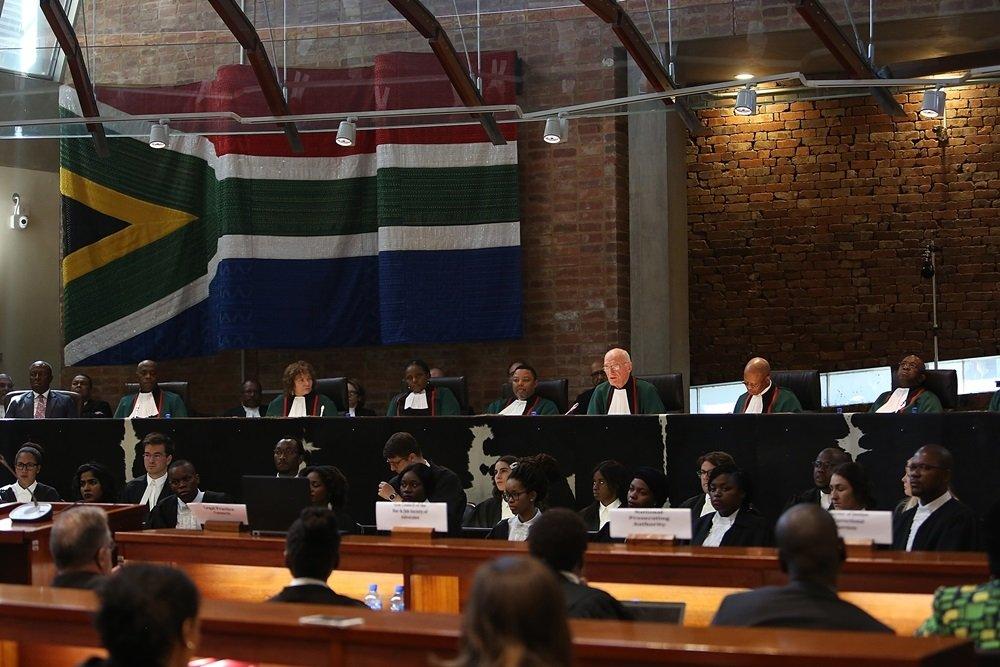Africa-Press – South-Africa. It is the end of the road for foreign nationals who want to be admitted and enrolled as legal practitioners in South Africa but lacked permanent residency following a Constitutional Court judgment.
On Tuesday, the Constitutional Court ruled only South Africans or permanent residence holders could practice law in the country.
According to one of the applicants in the case, the Asylum Seeker, Refugee and Migrant Coalition, the “impact of the representations of non-citizens in the profession [would] be dire”.
The coalition’s Muchengeti Hudson Hwacha said: “The inordinate delay that it would take for most non-citizens to acquire permanent residence [because of capacity issues at the Department of Home Affairs] means that they will effectively sit on their qualifications for years and in the case of refugees probably for over a decade.”
Hwacha added this was “unfortunately the end of the road in terms of this particular application going through the courts”.
“We are, however, determined to continue to explore other avenues for redress, including advocacy.”
Anesu Dera from the Centre for Applied Legal Studies told News24 the centre respected the judgment even though it might not be in its favour.
He said:
“They are generally allowed to study in South Africa and there is no law that prevents them from doing articles but they can’t practice in our courts.”
Dera added, for some of them, if they were to return to their country, there was a high chance of them being “harmed”.
“… some have refugee permits; they can’t go back to their country. They have valid permits; they are not illegal immigrants and can’t go home. We are talking about someone who has papers from Home Affairs.
“Some of them have a spousal permit which entitles them to work. But now as long as you are not a citizen or have a permanent residence, you cannot practice law, despite the fact that you have studied it and have legal papers.”
Dera said the Constitutional Court ruling was the end of the road.
“There is no remedy to rectify that from a legal point of view.”
On Tuesday, the court dismissed a group of foreign nationals’ leave to appeal a Free State High Court judgment.
Ex-top Rwanda official jailed for 20 years for role in bloody 1994 genocide
It also declined to confirm Section 24(2) of the Legal Practice Act 28 of 2014 (LPA) is unconstitutional and invalid to the extent that it does not allow foreigners to be admitted and authorised to enrol as non-practicing legal practitioners.
News24 reported in September last year, the Bloemfontein High Court had declared that section unconstitutional and invalid but found the discrimination in Section 24(2)(b) of the LPA was fair.
One of the applications was brought by Relebohile Cecilia Rafoneke and Sefoboko Phillip Tsuinyane, both Lesotho nationals who wanted to practice in South Africa.
Another was brought by Zimbabwe nationals Bruce Chakanyuka, Nyasha James Nyamugure and Dennis Tatenda Chayda – all facing the same issues as Rafoneke and Tsuinyane.
Rafoneke and Tsuinyane both studied at the University of the Free State, where they obtained LLB degrees. They entered into contracts of articles of clerkship, completed vocational training and passed the practical examination for attorneys.
When they applied to be admitted and enrolled as attorneys of the High Court, their applications were dismissed because they were neither South African citizens nor lawfully admitted to this country as permanent residents.
Mugabe-era Zimbabweans who fled to Botswana lose political refugee status after court ruling
All the applicants have permits which entitle them to work, which includes refugee, spousal, and general work permits.
The applicants argued the impugned provisions restricted their rights to be admitted into the legal profession.
On Tuesday, the apex court said Section 24 (2) of the LPA was legislation that regulated practice legally related occupations and professions in general.
It, however, concluded the “regulatory competence exercised cannot be said to extend to non-citizens and their choice of profession as section 22 is a right in the Constitution that does not extend to them”.
The Constitutional Court said the fact non-citizens did not have rights that accrued under section 22, did not mean they were not entitled to enter certain categories of professions in the country.
In addition, it added the differentiation between citizens and permanent residents on one hand and foreign national on the other did not amount to discrimination which was unfair.
The court said when “students who are neither citizens nor permanent residents make the choice to study in the country and then proceed to do vocational training such as articles and pupilage, they make this choice fully conversant with the fact that they are not eligible for admission; or at the very least, they ought to be conversant”.
“This is all the more, given the fact that their respective study visas only allow them to undergo training in their field of study, practical vocational training being one such type of training, and does not grant them the entitlement to be admitted as practising legal professionals.”
Justice Minister Ronald Lamola and Legal Practice Council chairperson Janine Myburgh welcomed the judgment.
For More News And Analysis About South-Africa Follow Africa-Press






